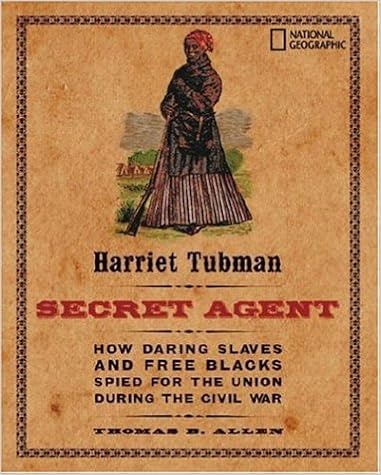Move over Andrew Jackson, Harriet Tubman is about to replace Jackson on the face of a new $20 bill. Many books have been written about Harriet Tubman who is well known for her work on the Underground Railroad, helping free slaves from the south during the Civil War. But one book in particular goes into more detail regarding covert operations and human intelligence that helped the Union win the war. Harriet Tubman, Secret Agent: How Daring Slaves and Free Blacks Spied for the Union During the Civil War by Thomas B. Allen.
Allen helps to bring to light Harriet Tubman’s roles as spy, secret agent, and military leader. The book also looks at others who helped spy for the North such as Elizabeth Van Lew who devised a code to transmit information that she picked up at society gatherings. The book, published by National Geographic, is available from Amazon https://www.amazon.com/Harriet-Tubman-Secret-Agent-Daring/dp/0792278895/

More was written about her on National Geographic’s site, news.nationalgeographic.com:
Most people know her as a former slave that freed others. During the Civil War, Harriet Tubman was also a secret spy and military leader.
In 1863, Harriet Tubman led soldiers with Colonel James Montgomery to raid rice plantations along the Combahee River in South Carolina. They set fire to buildings, destroyed bridges, and freed many of the slaves on the plantations.
When slaves saw Tubman’s ships with black Union soldiers on board, they ran towards them as their overseers helplessly demanded that they stay. One overseer reportedly yelled “See you to Cuba!” (At the time, Confederates were trying to spread a rumor that the Union would ship runaway slaves to Cuba to work on sugar plantations.)

Tubman, who will replace President Andrew Jackson on the front of the $20 bill, is most known to Americans for leading hundreds of slaves to freedom on the Underground Railroad. But she also played a crucial and pioneering role in the Civil War.
In addition to being the first woman in U.S. history to lead a military expedition, Tubman—whom John Brown called “General Tubman”—was a Union army spy and recruiter.
“She was one of the great heroines of the Civil War,” says Thomas B. Allen, author of Harriet Tubman, Secret Agent. “But her recognition didn’t come till many years after the war.” (She didn’t receive her pension until 1899.)
The use of former slaves as spies was a covert operation—President Abraham Lincoln didn’t even tell the Secretary of War or the Secretary of Navy about it. The man in charge of the secret spy ring was Secretary of State William Seward, who’d met Tubman when his house was a stop on the Underground Railroad.
Tubman and other former slaves were effective as spies because white Confederates devalued their intelligence.
“They had lived their lives as invisible people,” writes Allen in his book. “That quality of invisibility, which Harriet Tubman knew so well, became the basis for using ex-slaves as spies for the Union.”
